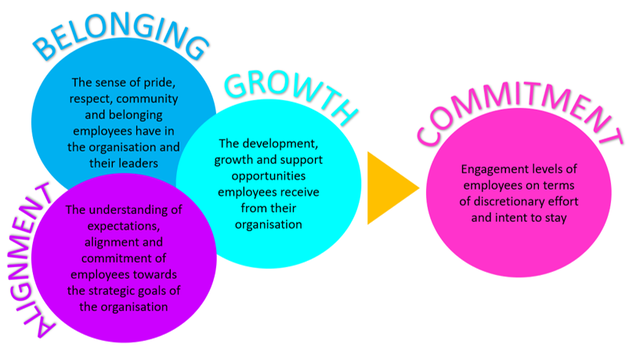
Employee engagement is defined as the emotional commitment an employee has for a job or organisation, which then drives their performance.
Countless studies have proven that an engaged workforce contributes significantly to a business’ success. Results range from happier customers to higher profits and stock prices, to lower health care costs. Moreover, experts say employee engagement is doubly important in times of economic recession, uncertainty or boom, because this is when the human element differentiates those who fail, survive or thrive.
One way to drive engagement is to consider what employees want out of their employer or job, and how to fulfil those desires. According to “Generations at Work,” a survey by think tank Future Workplace, employees list these top nine characteristics as the most important to their job satisfaction. These characteristics were stable across demographics of gender, age and ethnicity.
How can we help?
Countless studies have proven that an engaged workforce contributes significantly to a business’ success. Results range from happier customers to higher profits and stock prices, to lower health care costs. Moreover, experts say employee engagement is doubly important in times of economic recession, uncertainty or boom, because this is when the human element differentiates those who fail, survive or thrive.
One way to drive engagement is to consider what employees want out of their employer or job, and how to fulfil those desires. According to “Generations at Work,” a survey by think tank Future Workplace, employees list these top nine characteristics as the most important to their job satisfaction. These characteristics were stable across demographics of gender, age and ethnicity.
- Company Values. Companies with strong values typically draw employees who share those values, creating a dynamic of loyalty and shared commitment to the business’ brand and mission. Be sure to promote your business’ values externally and internally, so both current and prospective employees know where you stand.
- Skill Set Development. This characteristic is particularly true for younger workers, but all workers desire to stay up to date on emerging skill sets. This desire has increased in recent years, due to the rapid pace that technology is changing the way businesses work and the skill sets they require.
- Flexible Benefits and Rewards. Employees are looking for more than just a salary, and appreciate the ability to choose their benefits, forms of recognition or rewards. One employee might prefer health benefits that extend to a discount on their gym membership or alternative medical treatments. Another might be interested in working at a different location, or furthering their education. Be flexible and creative; let employees choose what benefits and rewards they prefer.
- Company Brand. Every year hundreds of companies spend countless hours doing paperwork, surveys, polls and other drudgery in order to apply for Fortune’s prestigious “Best Places to Work” list. Many large corporations have whole teams committed to gathering data and submitting their application. Why? Brands matter and being known as one of the best places to work is a sure way to lure talent.
- Career Advancement Opportunities. In today’s tough job market, workers want to be sure their career has a future that fits into the changing economy. Businesses that are clear about the possible career paths they offer are more likely to attract and retain top talent.
- Social Responsibility. Big business’ image took quite a hit in the last 15 years due to the excesses and abuses of power demonstrated by some companies. Over-the-top CEO salaries, mortgage fraud, environmental hazards and more contributed to a distrust of large corporations. Employees have always wanted to work for a company they believed was socially responsible, but more so today. Employees care that their companies are ethical in how they do business and treat people.
- Telecommute Option. Employees want the freedom to choose their work location, whether it’s from home, overseas, in the office or in multiple offices. While some businesses still resist this trend, modern technology has levelled the playing field for telecommuters and in-office staff. In fact, some workers are able to accomplish more outside the office where they can work uninterrupted.
- Support for Continued Education. Along with a clear career path and ongoing skill development, employees value the ability to advance their skills through further education. Moreover, employers can hire recent graduates and groom them for executive positions through sponsored MBAs or other advanced degrees.
- A Friendly Office Environment. Workers want to work with people they like. This characteristic is especially true for younger workers, who are hyper connected through social media and mobile technology. To fuel engagement, be flexible about how employees form teams, allowing them to work with or for people they enjoy.
How can we help?
- Help you to build a comprehensive induction/on-boarding process to inspire confidence and buy-in from day one for your employees
- Employee satisfaction survey's
- Focus groups


